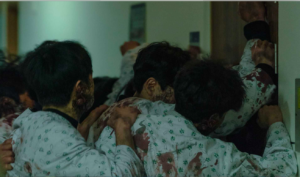
As an addition to the now thriving genre of Korean zombie/monster hybrids, Dark Hole was exciting. The show was heavy on two elements: action and set-up. There was plenty of running, snarling and blood spattering as the small town of Muji succumbed to mysterious black smoke that turned people into “mutants”. So too were a whole host of plot points introduced, enough to create endless questions. What, or who, is controlling this smoke? What actually is the titular “dark hole”? How does the ‘monsterisation’ process of becoming a mutant actually work?
Notice the use of “was” here, because, whilst the show was exciting, the latter half of Dark Hole has proven to be a massive mishandling of the first half’s promise. With a lack of key character development, weak themes, and poorly-handled plotlines, the show manages to smash almost every plate that it had spinning. Starting as an intriguing new addition to Hallyu’s growing monstrous canon, Dark Hole ultimately disappoints in its failure to utilise any of the potential it showed in its first half.
Perhaps the most frustrating failure of Dark Hole is in its failure to commit fully to its monsters and its supernatural elements. When it comes to horror, the best technique to arouse fear is often to reveal as little as possible about the source of that fear. Ambiguity and mystery leave room for possibility and imagination, room for the monster under the bed to be worse than you could ever expect.
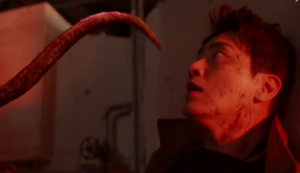
Dark Hole took a brave turn in deciding not to do this with its monsters: they have a point of view, being driven into a red haze of violence where their hallucinations of evil drive them to kill. They even have a central power source in a disembodied, maniacal voice, with occasional tendrils floating out to—literally—strike out at victims. This seemed to be zombies as worker bees, with an enigmatic queen controlling her colony for some evil purpose. What was this purpose? Why was this happening?
Initially the second half of the season dangled tempting answers about this, in the role of the shaman, played with malicious glee by Song Sang-eun. As the human-to-mutant ratio swells towards the latter, her enigmatic wisdom and confidence in her connection to the events around her enables her to build up a loyal cult of terrified survivors.
She is shown communing directly with the disembodied voice at the centre of the chaos, referring to herself as the “chosen one”. She uses this control to stop the mutants at will, and to manipulate those around her. A key player in the mythos of this show, no doubt. Surely the nature of her connection will be revealed at the show’s climax, her role in the ultimate reason behind the bloodshed made clear?
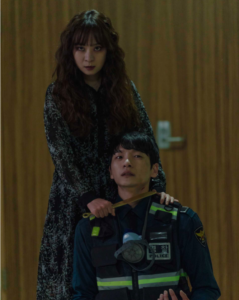
Sadly, this is not what happens. Whilst her character is revealed during later episodes to be more desperately “pick me” than “chosen”, we are never treated to the ultimate reason why she could commune with this source of evil so well in comparison to anyone else. Her position as a shaman is constantly signposted through her use of ritual tools, and even a full-blown altar, but this is ultimately window dressing to signify that she is just inherently ‘mystical’. How her shamanism connects to the mutants and their master is never addressed, and ultimately feels like a lazy use of a Korean tradition which has so much depth and history to it.
This laziness extends its tentacles into every other facet of the show’s mythos as well, most disappointingly in its central villain. The sentient, evil force, that is introduced early in the series as the controlling puppet master of the mutants, is the key mystery of the story as it progresses.
Its voice is heard by a select few individuals who have inhaled the black smoke but not fully transformed into monsters, taunting and laughing at the death and destruction it has caused. It also manifests in aforementioned tendrils, of seemingly endless length and enough power to pierce (frequently) through people. Never showing more than a few tentacles, never explaining its purpose, or where it has come from, the intrigue around this thing is admittedly built up well. As mentioned above, the show seems to understand here that this creature’s ultimate terror is in being unknown. That is, until the final episode.
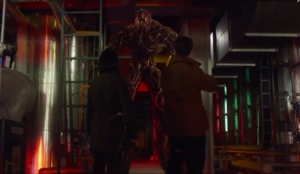
It cannot be stressed enough how much this villain’s reveal lets down the entire series up to this point. With the tension being developed so skilfully up until the show’s final moments, the decision to finally display this creature is, to say the least, baffling. And how it’s displayed? The tendrils, seen previously dangling and slinking so creepily along vents and pipes, gather together to form what can only be described as a tendril giant. Kind of like Marvel’s Ultron, if he was made from tree branches.
Gone is the ambiguity, gone is the fear, and gone is any interest in this monster. The design of this creature’s final form is almost laughable, and, unsurprisingly, makes it easily dispatched in the plot’s final moments with no flare, but instead with just nitrogen and a bullet. Pulling back the curtain on this mystery shows us absolutely nothing, and undermines all the horror that has gone before.
This is not the only plot point that stubbed out myriad exciting questions raised earlier in the show’s run. With tendril-man’s appearance and subsequent swift destruction, we are left with no explanation as to why any of the series’ events had happened. Why the mutants, why the smoke, even the title’s dark hole is left abandoned without a glance back. There are questions that seemed to be posed to provide interesting solutions in this narrative that, after this climax, we understand are actually just plot holes.
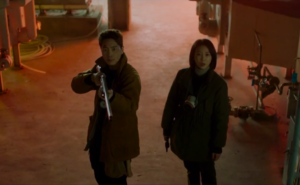
The most glaring of these is why, when inhaled, most people immediately transform into mindless mutants, but others don’t. Is it to do with individual strength, as detective Lee Hwa-sun (Kim Ok-bin) seems to represent? Or is it related to unfinished business, as with crazed serial killer Yoon Saet-byeol (Lee Ha-eun)? When no answer is provided, we are left to assume that the lore of the black smoke is simply: you won’t turn immediately if you’re one of the main actors. Examples like this show the wasted potential of the mythology built up in the show’s first half.
The show’s weak mythology might not have been such a distraction if it weren’t for the similar lack of development in many of the key characters. As Dark Hole develops, it becomes clear that our leads—Kim Ok-bin and Lee Joon-Hyuk—are not going reveal multiple layers and identifiable personalities. This is largely due to the perfunctory nature of the script, though these leads, along with Park Keun-rok as worthy teacher Mr Choi and Oh Yu-jin as seemingly meek Dong-rim, do little to make their performances nuanced.
This is instead left to several of the show’s secondary characters, most notably Lim Won-hee as cowardly but good-hearted Park Soon Il. Whilst this is a genre that does tend towards broader character strokes, the blandness of most of these characters prevents any attachment to them as the show develops.
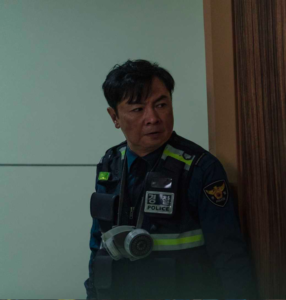
Lim manages to embue his bumbling cop character with enough pomp and humour to demonstrate his character’s pride but ultimately good heart. Most of the rest of the cast do not reach his level, with the possible exception of Song Sang-eun’s wicked and ultimately pathetic shaman. Whilst the latter half of Dark Hole’s narrative structuredoes expand upon these characters’ various storylines, it does not allow space to grow their actual personalities, leaving most as little more than video game avatars.
Given various unsatisfactory plot conclusions, the drama also slips up on exploring any of its themes with real poignancy. Throughout the series, the concepts of faith and trust are the most integral of these. Characters constantly have to trust in others’ assertions that they haven’t inhaled smoke, survivors need to find places to hide that they can trust are safe, and of course, we have the mysterious shaman’s speedily assembled cult. This cult is actually mirrored by one we meet in episode three, a Doomsday cult that takes in Hwa-sun and Do-Yoon (Lee Ye-bit), only to attempt to force them to drink poison before the smoke conveniently takes them over.
This has parallels with the fanatic behaviour that the shaman’s followers display in obeying her orders, even up to the point of human sacrifice. There is a point to be made here about the origin of fanatical devotion in fear, and in how messily these groups always conclude. But this point is an obvious one, and ultimately it does not lead the narrative in any solid direction. It just becomes a quirky side note as the drama’s storylines collapse into unexplained endings.
The lack of explanation to so many of the plotlines, that seemed so deliberately built in to provide interesting pay-offs, is what ultimately makes Dark Hole a disappointment. Promising new angles to the zombie/monster genre, the show seemed to instead forget these promises had been made, and end on a whimper, rather than a bang.
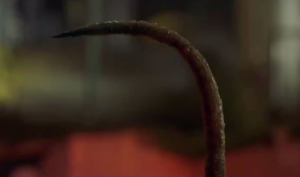
Whilst the sheer number of storylines and questions to be answered had potentially backed Dark Hole into a corner, the resulting episodes of the series prove that the response to this is not to ignore these questions altogether. There was so much potential in the premise that, initially, the character flaws and question marks did not matter. When that potential is wasted, we are left with a Dark Hole of narrative and plot, and not the next step forward in Korean horror.
(Images via OCN.)


